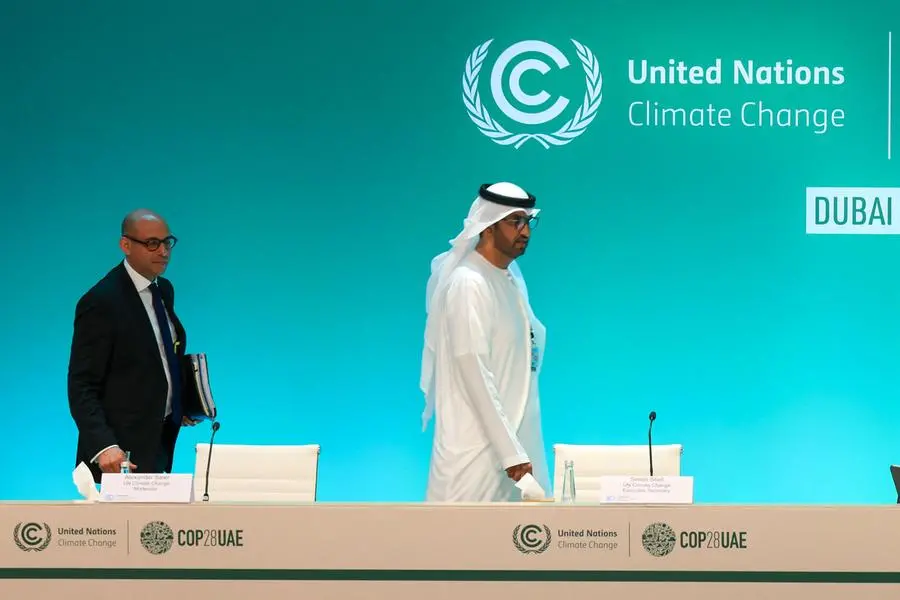PHOTO
DUBAI - At the World Climate Action Summit today, Dr. Sultan bin Ahmed Al Jaber, Minister of Industry and Advanced Technology and COP28 President, unveiled the Global Decarbonisation Accelerator (GDA), a series of landmark initiatives designed to speed up the energy transition and drastically reduce global emissions.
The GDA is focused on three key pillars: rapidly scaling the energy system of tomorrow; decarbonising the energy system of today; and targeting methane and other non-CO2 greenhouse gases (GHGs). It is a comprehensive plan for system wide change, addressing the demand and the supply of energy at the same time. The GDA has been informed by the thinking of key stakeholders, including international organisations, governments and policymakers, NGOs, and CEOs from every industrial sector.
Commentating on the launch of the GDA, Dr. Al Jaber said, “The world does not work without energy. Yet the world will break down if we do not fix energies we use today, mitigate their emissions at a gigaton scale, and rapidly transition to zero carbon alternatives. That is why the COP28 Presidency has launched the Global Decarbonisation Accelerator.”
Rapidly scaling the energy system of tomorrow
Today 116 countries have signed the Global Renewables and Energy Efficiency Pledge as of today, agreeing to triple worldwide installed renewable energy generation capacity to at least 11,000 gigawatts and to double the global average annual rate of energy efficiency improvements from around 2 percent to more than 4 percent every year until 2030.
Through the UAE Hydrogen Declaration of Intent, 27 countries have agreed to endorse a global certification standard and to recognise existing certification schemes, helping to unlock global trade in low-carbon hydrogen.
Decarbonising the energy system of today
Under the GDA, 50 companies, representing over 40 percent of global oil production have signed on to the Oil and Gas Decarbonisation Charter (OGDC), committing to zero methane emissions and ending routine flaring by 2030, and to total net-zero operations by 2050 at the latest. Over 29 National Oil Companies (NOCs) have committed to the Charter – the largest ever number of NOCs to sign up to a decarbonisation pledge. The OGDC is an important step towards the industry-increasing actions aligned with the aims of the Paris Agreement.
Signatories to the Charter agree to target a number of key actions, including:
- Investing in the energy system of the future including renewables, low-carbon fuels and negative emissions technologies.
- Increasing transparency, including enhancing measurement, monitoring, reporting and independent verification of GHG emissions and their performance and progress in reducing emissions.
- Increasing alignment with broader industry best practices to accelerate decarbonisation of operations and aspire to implement current best practices by 2030 to collectively reduce emission intensity.
- Reducing energy poverty and providing secure and affordable energy to support the development of all economies.
The GDA also includes the launch of the Industrial Transition Accelerator (ITA), which will accelerate decarbonisation across key heavy-emitting sectors, and encourage policymakers, technical experts and financial backers to work hand-in-hand with industries to unlock investment and rapidly scale the implementation and delivery of emissions-reduction projects. Under the leadership of the COP28 Presidency, UNFCCC, and Bloomberg Philanthropies, the ITA Secretariat will be hosted by the Mission Possible Partnership (MPP).
Methane and other non-CO2 greenhouse gases
The third pillar of the GDA will addresses methane and other non-CO2 greenhouse gases through economy-wide methane-emission reduction. In support of this, more than US$1 billion will be mobilised for methane abatement projects, with additional information to be released on 5th December at the COP28 Energy Thematic Day.
The GDA also covers the Global Cooling Pledge, which targets substantially reducing global cooling emissions by 68 percent by 2050. Such emissions account for seven percent of the global total, a figure expected to triple as more nations adopt air-conditioning. As of today, 52 countries have signed the Pledge.
Dr. Al Jaber said, “The GDA represents an inflection point for addressing various challenges that to date have slowed down the energy transition. Each initiative is underpinned by ongoing accountability frameworks to ensure that the commitments made, are commitments delivered.”
In his closing remarks, the COP28 President was optimistic, stating, “The GDA adds up to more countries and more companies from more sectors than ever before, all aligning with our North Star of 1.5C”.





















